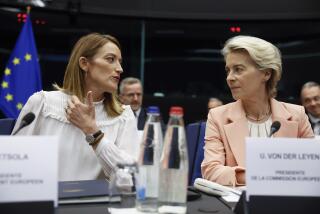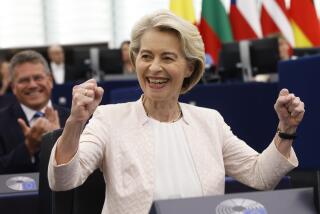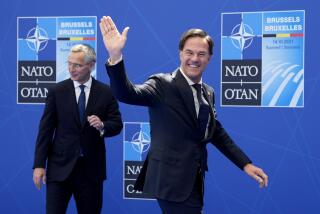Dutchman to Head New European Central Bank
- Share via
BRUSSELS — A 62-year-old Dutch central banker with a fondness for light music and tight monetary policies is the new Alan Greenspan of Europe.
Wim Duisenberg was chosen by European Union leaders at a Brussels summit to head the European Central Bank, which will dictate monetary policy and set a single interest rate for the 290 million people from Portugal to Finland who will start using the EU common currency, the euro, on Jan. 1.
He almost was just another Dutchman who lost the big prize. His supporters had to overcome months of dogged opposition to his nomination from the French, who wanted their own central bank chief, Jean-Claude Trichet, for the job.
Duisenberg was the favored candidate of most EU governments because of his 15-year success as Dutch central bank chief in keeping the Netherlands’ monetary unit, the guilder, pegged to the German mark, Europe’s strongest currency.
Duisenberg and five Executive Board members will be joined by 11 national central bank governors on a council that will set interest rates after the euro’s introduction.
France, fearing undue German influence over the Frankfurt-based bank, had threatened to veto Duisenberg’s appointment unless Trichet was named his successor.
Under a compromise, Duisenberg will step down midway though his eight-year term and be succeeded by Trichet in a job that could eventually rival that of the U.S. Federal Reserve Board chairman.
“I will retire early from the ECB for age reasons,” Duisenberg said. “I want to stay until notes and coins are in circulation. I want to make clear this is fully my decision.”
Even a truncated term can be seen as a victory for the Dutch, whose candidates have scored a number of near-misses for plum posts this decade, such as the top jobs at the European Commission and the North Atlantic Treaty Organization.
A chain-smoking fan of U.S. country music, Duisenberg was considered a shoo-in for the job when he took over last year as head of the European Monetary Institute, precursor of the central bank. Fellow central bankers and most EU governments backed him.
France begged to differ, and it nominated Trichet in November. While some observers saw the French move as a bargaining tactic, designed to wrest concessions in other areas of EU policy, the French government stood by its man until the last minute.
Some French officials said that Germany had agreed that Europe’s first central banker would be from France as a secret quid pro quo in the 1993 deal that put the headquarters of the European Central Bank in Frankfurt, home of the German Bundesbank. The Germans denied any such agreement.
Behind the personnel jockeying lay a rift over the role of central banks in managing economies and over their accountability to democratic institutions.
The French were never comfortable with the German model of an independent central bank that is pledged to fighting inflation instead of promoting growth and jobs.
A French victory in the central bank dispute would have been “the worst outcome for the markets,” said Julian Jessop, an analyst at Nikko Europe in London. “The Netherlands has a greater commitment to fiscal discipline and to a strong euro than France. The markets would be worried that a French-led ECB would be less rigorous.”
On paper, the European Central Bank will be the world’s most independent central bank.
Its freedom to set interest rates as it chooses is enshrined in the Maastricht Treaty, the EU’s constitution. The Bundesbank’s independence, on the other hand, could in theory be overturned by an act of the German parliament.
Duisenberg was Germany’s pick from Day 1. He hewed to Bundesbank-led tight monetary policies throughout his 15 years as president of the Dutch central bank, keeping the guilder in a virtual monetary union with the mark, which will be replaced by the euro as Europe’s anchor currency.
Analysts have ranked Duisenberg as the toughest central banker from the 11 countries set to move to the euro.
More to Read
Sign up for Essential California
The most important California stories and recommendations in your inbox every morning.
You may occasionally receive promotional content from the Los Angeles Times.













